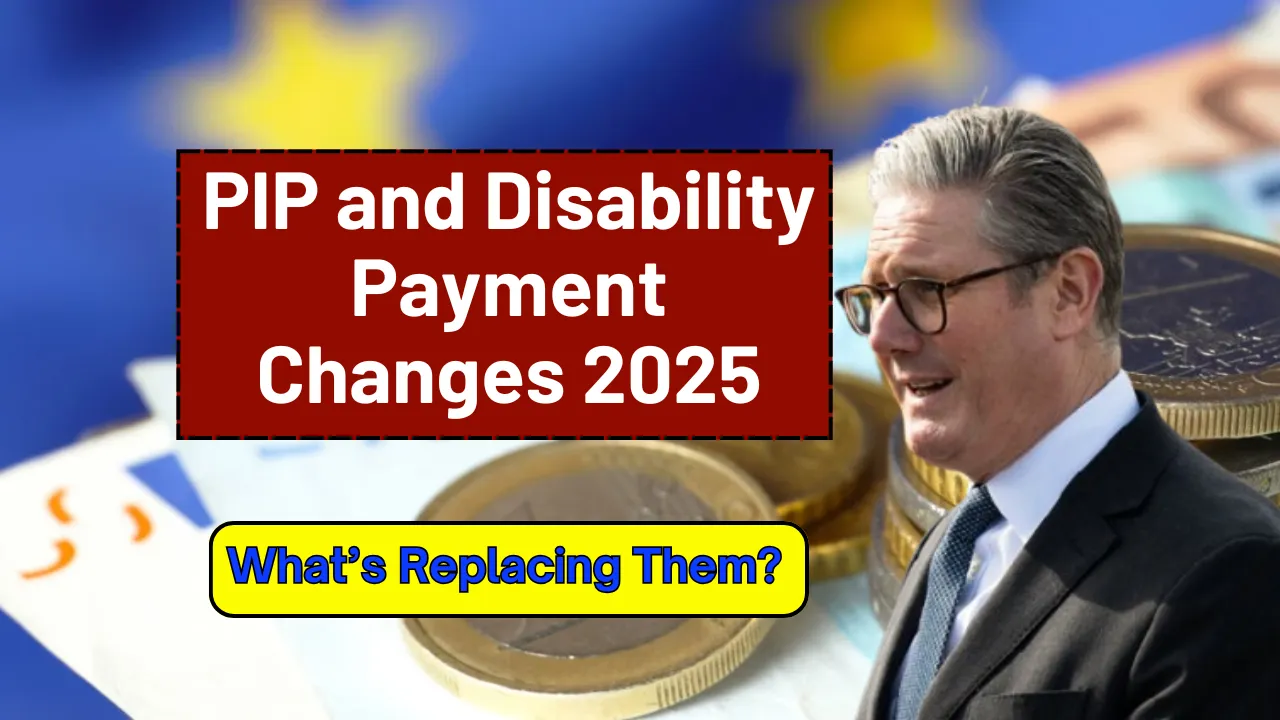PIP and Disability Payment Changes 2025: In a major shift to the UK’s welfare system, the government has announced plans to replace cash payments for Personal Independence Payment (PIP) and other disability benefits with a new voucher-based system. Starting in mid-2025, this change will affect millions of people who currently rely on monthly cash deposits to manage their disability-related expenses. The goal is to ensure that support is directed towards essential needs while reducing the risk of misuse.
The PIP and Disability Payment Changes 2025 will see traditional bank transfers replaced by vouchers or prepaid cards. These vouchers will be specifically designed for purchasing healthcare items, mobility aids, and other disability-related services. This article explains why the change is happening, how the new system will work, who it will impact, and what concerns have been raised by both recipients and advocacy groups.
PIP and Disability Payment Changes 2025: What You Need to Know
The PIP and Disability Payment Changes 2025 aim to reform how disability benefits are distributed across the UK. Instead of receiving unrestricted cash payments, eligible individuals will get vouchers that can only be used for approved goods and services. This approach is intended to promote responsible spending and ensure that funds are spent on genuine disability support.
Overview of PIP and Disability Payment Changes 2025
| Feature | Current Cash Payments | New Voucher System |
| Form | Direct bank deposit | Prepaid voucher or digital card |
| Usage | No restrictions | Disability-related expenses only |
| Average Monthly Value | Around £570 | Equivalent value in vouchers |
| Risk | Potential misuse | Controlled, traceable spending |
| Administration | Manual processing | Automated, centralized system |
| Rollout Timeline | N/A | Pilot mid-2025, full rollout late 2025 |
Why the Change is Happening
The rapid rise in PIP claims, especially those linked to mental health conditions like anxiety and depression, has pushed the government to reconsider how disability benefits are delivered. With over 3.3 million people currently receiving PIP, concerns about sustainability and fair distribution have led to this reform.
The Department for Work and Pensions (DWP) believes that by introducing vouchers, support will be better targeted. The new system is also designed to encourage individuals with less severe conditions to engage more actively in the workforce, while ensuring those with significant disabilities receive appropriate assistance.
What Will Replace Cash Payments?
Under the new system, cash deposits will be replaced by vouchers or prepaid cards. These will be redeemable at approved retailers, pharmacies, and online platforms that supply disability-related products. Instead of receiving cash to spend freely, recipients will use these vouchers to purchase essentials like mobility equipment, healthcare supplies, or work-related tools.
This model is intended to promote independence while ensuring that government funds directly address disability-related needs.
How PIP Vouchers Work
PIP vouchers will operate through a secure network of providers, both in-store and online. Here’s how they will function:
- Redeemable Only for Approved Goods: Items such as medical equipment, mobility aids, or services linked to disability support.
- Digital and Physical Options: Vouchers may be issued as cards or digital codes.
- Automated Tracking: Every transaction will be traceable, reducing fraud and financial abuse.
The DWP is also working on making these vouchers anonymous to protect user privacy and avoid unnecessary stigma when shopping.
Benefits of Moving to a Voucher System
According to the government, the new voucher-based system will bring several advantages:
- Reduced Risk of Misuse: Funds will only be used for their intended purpose.
- Simplified Budgeting: Especially helpful for those with cognitive challenges.
- Less Administrative Error: Automated systems will streamline processing.
- Better Access to Essential Goods: Direct links to approved retailers will make it easier to obtain necessary items.
The DWP also expects this system to support people transitioning into employment by providing work-related equipment through vouchers.
Updated Eligibility for PIP Vouchers
Eligibility for the new system will largely mirror current PIP rules but with some refinements to ensure that support is directed to those with substantial needs. To qualify for PIP and Disability Payment Changes 2025, applicants must:
- Have a long-term medical condition that significantly affects daily living or mobility.
- Demonstrate limited capacity to work or a need for additional daily support.
- Have lived in the UK for at least three years prior to applying.
These updates aim to focus resources on individuals with serious, ongoing disabilities.
Concerns and Social Implications
While the shift to vouchers is seen by some as a positive step toward better control, it has sparked concerns about personal freedom and privacy. Critics argue that limiting spending options could reduce autonomy and potentially expose recipients to judgment when using vouchers in public.
There are also fears that the system might not cover all necessary expenses, leaving gaps in support for certain individuals. The government has responded by promising anonymous digital vouchers and expanding the list of participating retailers to include mainstream outlets.
Government’s Roadmap and Implementation
The DWP has outlined a phased rollout for the PIP and Disability Payment Changes 2025. Pilot programs will begin in mid-2025, targeting select regions to test the system before nationwide implementation by the end of the year.
The reform comes alongside a projected 52% increase in disability support funding between 2023 and 2028. This boost is intended to cover administrative changes and provide additional resources where needed.
Conclusion
The UK’s decision to move from cash payments to a voucher system for PIP and disability benefits marks a significant transformation in welfare policy. While the new approach is designed to reduce fraud and ensure targeted support, it also raises valid concerns about choice, privacy, and flexibility for recipients.
As the PIP and Disability Payment Changes 2025 roll out, it will be crucial for the government to balance efficiency with dignity. Those affected should stay informed through DWP updates and prepare for the transition by understanding how vouchers will work in practice.
FAQs About PIP Voucher System
What is replacing PIP cash payments in 2025?
Vouchers that can be used for disability-related goods and services.
Who qualifies for the new voucher system?
Individuals with long-term health conditions affecting daily life or mobility who meet residency requirements.
When will the PIP voucher rollout begin?
Pilot programs start mid-2025, with full implementation expected by late 2025.
Can vouchers be used like cash anywhere?
No, they are limited to approved retailers and specific disability-related purchases.
Will I still receive the same amount as before?
The value will be equivalent but provided in voucher form, focused on covering essential needs.












